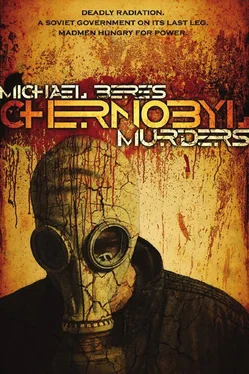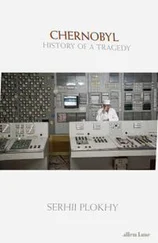Michael Beres - Chernobyl Murders
Здесь есть возможность читать онлайн «Michael Beres - Chernobyl Murders» весь текст электронной книги совершенно бесплатно (целиком полную версию без сокращений). В некоторых случаях можно слушать аудио, скачать через торрент в формате fb2 и присутствует краткое содержание. Жанр: Триллер, на английском языке. Описание произведения, (предисловие) а так же отзывы посетителей доступны на портале библиотеки ЛибКат.
- Название:Chernobyl Murders
- Автор:
- Жанр:
- Год:неизвестен
- ISBN:нет данных
- Рейтинг книги:4 / 5. Голосов: 1
-
Избранное:Добавить в избранное
- Отзывы:
-
Ваша оценка:
- 80
- 1
- 2
- 3
- 4
- 5
Chernobyl Murders: краткое содержание, описание и аннотация
Предлагаем к чтению аннотацию, описание, краткое содержание или предисловие (зависит от того, что написал сам автор книги «Chernobyl Murders»). Если вы не нашли необходимую информацию о книге — напишите в комментариях, мы постараемся отыскать её.
Chernobyl Murders — читать онлайн бесплатно полную книгу (весь текст) целиком
Ниже представлен текст книги, разбитый по страницам. Система сохранения места последней прочитанной страницы, позволяет с удобством читать онлайн бесплатно книгу «Chernobyl Murders», без необходимости каждый раз заново искать на чём Вы остановились. Поставьте закладку, и сможете в любой момент перейти на страницу, на которой закончили чтение.
Интервал:
Закладка:
“I’m reminded of a steam bath in Moscow,” said Pavel, resealing a letter and adding it to the growing pile on his left.
“The steam baths in Kiev are better,” said Nikolai.
“In what way?”
“The women.”
“I don’t believe you,” said Pavel. “Not even in these so-called times of change. You play with your nuts underwater, and you see tits on boys.”
“That reminds me,” said Nikolai. “Soon it will be May.”
“What does May have to do with women in the Kiev baths?”
Nikolai resealed a letter he had been reading and tossed it onto the pile. “In May chestnuts and lilacs are in bloom. While we sit in our Pripyat sweatbox, workers prepare for May Day parades. Last year, naked women were in the Kiev parade.”
“The recent crackdown on drinking should apply especially to you,” said Pavel. “Or perhaps, like the Chernobyl workers, you’ve taken up hashish.”
“Don’t be a farmer,” said Nikolai, retrieving another letter.
“I’m not a farmer,” said Pavel.
“You smell like one.”
Pavel tossed a letter onto the pile and gave Nikolai a dismissive wave. “No wonder it stinks in here. With all this idiotic talk and all this heat…”
“Captain Putna should issue deodorant,” said Nikolai.
They were quiet for a time, reading letters, frowning, and adding letters to the finished pile. Finally, Pavel spoke.
“The postmaster has an oscillating fan in his office. Tomorrow it will be in here.”
Nikolai fanned himself with a letter he had just opened. “If we had a window like the postmaster, we’d have a view and be able to smell the spring air instead of reading about it. I’m sick of reading about it.” Nikolai read from the letter. “‘Spring is pleasant here also.
Snows of February and March have nourished the winter wheat.
Father has planted our vegetable crop and all is well.’ I’m sick of hearing how all is well.” Nikolai opened a new letter, examined it.
“Here’s another to Juli Popovics, the Chernobyl technician babe.”
“She’s under observation,” said Pavel. “Who’s it from?”
“I know she’s under observation,” said Nikolai, somewhat annoyed. “It’s in Ukrainian from Aunt Magda in Kiev. She has prepared a room so Juli Popovics can visit for several months while the medical matter is addressed.”
“Sounds like she’s a Mommychka-to-be,” said Pavel.
“There must be much activity at Chernobyl,” said Nikolai.
“Aside from radioactivity.”
Nikolai put the letter to Juli Popovics in the tray for copying and began opening another.
“Still no mail for the engineer stud?” asked Nikolai, glancing at a list on the table headed by the words official observation.
“Nothing for Mihaly Horvath since February,” said Pavel.
“First his American cousin bugs him, then a batch of letters from his brother asking about some matter, then nothing.”
“The letters we copied may have had an effect,” said Nikolai.
“Like other Chernobyl workers before him, he’s gone mad and had to be taken away. Perhaps we’ll go mad. It’s spring and I feel like a caged animal. Can you imagine the heat in this room come summer?”
“I doubt if Mihaly Horvath has gone mad,” said Pavel. “As for us, the post office should supply chilled mineral water. Did you hear Gorbachev is now mineral secretary since he replaced vodka at official functions?”
“You already told me,” said Nikolai, wiping his brow with his sleeve.
“Don’t worry about the heat,” said Pavel. “Tomorrow we’ll have a fan to cool us, courtesy of our ersatz supervisor, the noble comrade postmaster.”
Because it had been stored in the underground garage, the inside of the Volga was cool and comfortable. Major Komarov tried to relax as Captain Azef drove slowly through Kiev’s noon-hour traffic. On the far side of Kirov Street, beyond Petrovsky Promenade, office workers lunched on benches beneath chestnut trees and on the green April lawn of Pervomaisky Park. Beyond the park, the river sparkled in the sun. Out in the river, the beach on Trukhanov Island glowed like a hot ember.
While he drove, Azef talked about automobiles. “Although the Zil is still used by high officials and has certain prestige, I still prefer the Volga. Even modified Chaikas with yellow fog lights are no match for the well-equipped Volga. Look at all those pieces of shit everyone else drives. Even the militia drives shitbox Zhigulis.”
Azef glanced to Komarov. “Sorry, Major. I’m speaking too much again.”
“Sometimes, Captain, it’s not how much you speak. It’s the nature of your conversation. Perhaps it would be better to concentrate on our visit to militia headquarters.”
Azef stopped the Volga behind a line of traffic waiting for pedestrians crossing to the park. “Will you tell Chief Investigator Chkalov about the investigation into shoddy parts from Yugoslavia?”
“Shoddy parts relates to new construction,” said Komarov. “Detective Horvath’s brother works in unit four, which is fully operational.”
“What about the woman?” asked Azef. “Will you tell Chkalov about her?”
“Detective Horvath’s brother managing to impregnate a co-worker is of no concern to the Kiev militia. Our purpose today is simply to determine whether the letters Detective Horvath sent his brother earlier in the year might have some relation to Chernobyl.”
“Chkalov is a brutish fellow,” said Azef.
Komarov glanced at Azef and had to restrain a smile. Azef of the KGB and Chkalov of the militia, what a pair of plump brutes they both were.
When they got out of the Volga at militia headquarters, Komarov had a quick cigarette before entering the building. Azef seemed about to mention the cigarette until Komarov glared at him. Then Azef simply waited for Komarov to finish his smoke.
Chief Investigator Chkalov’s office did not look like the office of a man who worked for a living. Except for a brass pen set, an intercom, and telephone, the desk was clear. Behind Chkalov on either side of an ornately curtained window stood flags of the Soviet Union, the Ukraine, the city of Kiev, and the Kiev militia. The walls contained photographs of appropriate officials surrounding a larger rendering of Lenin looking skyward. There were no maps of the city with stickpins, no scheduling boards, no piles of reports. A room meant for giving proclamations rather than the office of the chief of Kiev’s detectives, who sat behind the desk picking remnants of his lunch from his teeth with his fingernails.
Captain Azef sat to Komarov’s left, slouching in one of the plush guest chairs. Komarov had turned his chair at an angle so he could view both brutes at once. Because there was no ashtray, he did not smoke.
“So,” said Chkalov, “the KGB wishes to inquire about Detective Horvath.”
Komarov was about to speak when Azef broke in. “Yes, Comrade Chief Investigator. We would like to know something about him.”
Komarov glared at Azef. “If you don’t mind, Captain.”
Azef gripped the arms of his chair as if to pull himself from its depths. “Certainly, Major.”
“Thank you,” said Komarov, turning to Chkalov, who seemed amused at this pettiness. “Chief Investigator Chkalov, as you know, it is often in the state’s interest to gather information about certain citizens. This is not to imply these individuals have broken laws; it is simply part of the overall fact-gathering responsibility of the KGB.”
Komarov knew he was stating the obvious. He often used this technique when interrogating officials. A few minutes of this, and Chkalov would relax his defenses. Komarov went on, stating in general terms the need for militia and KGB cooperation. During the speech, Komarov noticed Chkalov sit back, fold his hands on his desk, and smile. When he felt Chkalov was sufficiently relaxed, Komarov began the questioning.
Читать дальшеИнтервал:
Закладка:
Похожие книги на «Chernobyl Murders»
Представляем Вашему вниманию похожие книги на «Chernobyl Murders» списком для выбора. Мы отобрали схожую по названию и смыслу литературу в надежде предоставить читателям больше вариантов отыскать новые, интересные, ещё непрочитанные произведения.
Обсуждение, отзывы о книге «Chernobyl Murders» и просто собственные мнения читателей. Оставьте ваши комментарии, напишите, что Вы думаете о произведении, его смысле или главных героях. Укажите что конкретно понравилось, а что нет, и почему Вы так считаете.












